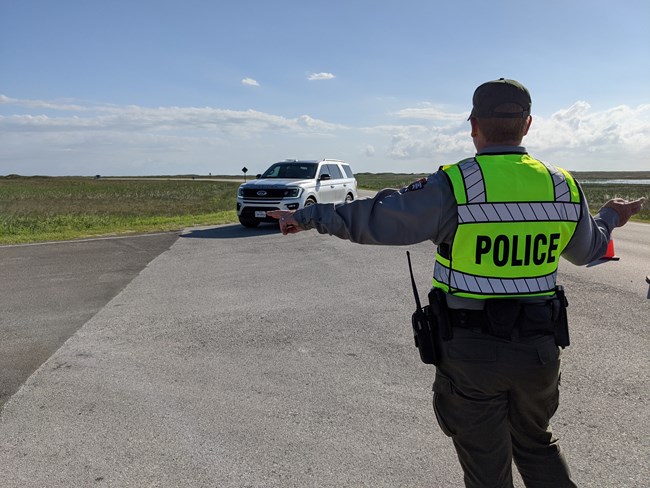|
The National Park Service carries out its responsibilities in parks and programs under the authority of federal laws, regulations, and Executive Orders, and in accordance with policies and Director's Orders established by the Director of the National Park Service and the Secretary of the Interior. 
NPS Photo Law EnforcementPadre Island National Seashore is an area of concurrent federal jurisdiction. All NPS law enforcement functions within the park are carried out by commissioned park rangers within the Division of Visitor & Resource Protection who are duly appointed federal law enforcement officers who are authorized to carry firearms, conduct investigations, make arrests and serve warrants pursuant to law and policy. Their duties include law enforcement, emergency medical services, search and rescue, wildland and structural firefighting, as well as visitor safety, assistance, and information. Code of Federal Regulations and Other Federal LawsFederal regulations that apply to all National Park Service sites can be found in the Code of Federal Regulations under Title 36. Among the federal laws that are enforced by commissioned park rangers are those within Title 16 of the United States Code (USC) that apply to the National Park System or all federal lands, federal criminal laws within Title 18 USC and various federal drug laws within Title 21 USC. Superintendent's CompendiumIn the Code of Federal Regulations (CFR), superintendents of each unit in the National Park System have the option to develop specific designations, closures, permit requirements, and other restrictions to address unique management needs in their park unit. Within the CFR, superintendents are given the authority to amend, modify, relax, or make more stringent certain regulations. These park-specific regulations are incorporated into a document called the Superintendent's Compendium and are an extension of the CFR. These publications help direct the park's management efforts to best serve the mission of the National Park Service and the needs of visitors. Common Law and Policy QuestionsThe following are common law and policy questions and the applicable regulations concerning them. This is not an exhaustive list of rules in the park. If you have questions concerning laws or policies, please review the resources above or contact the park. Federal law allows people who can legally possess firearms under applicable federal, state, and local laws to legally possess firearms in Padre Island National Seashore. Launching, landing, or operating an uncrewed aircraft from or on lands and waters administered by the National Park Service within the boundaries of Padre Island National Seashore is prohibited except as approved in writing by the superintendent. Exceptions are not provided for the purposes of recreation, including fishing. On the Laguna Madre side: Bird Island Basin offers a boat ramp with access to Laguna Madre. A valid Texas fishing license package (license and endorsement) is required to fish in the park, although exceptions may apply and fees vary. Children under 17 years of age do not require a license. Visitors fishing within Padre Island National Seashore must follow the fishing license requirements in accordance with the laws and regulations of the Texas Parks and Wildlife Department. Fishing licenses are not available for purchase inside of the national seashore. With the exception of waterfowl, NO game (wildlife) may be transported through the park by any means. For more information, see Superintendent's Compendium Section 2.2. For additional regulations on hunting, see 36 CFR Section 7.75 Padre Island National Seashore (b) Hunting. No. Possessing or using a mineral or metal detector, magnetometer, side scan sonar, other metal detecting device, or subbottom profile is prohibited. For additional information, see 36 CFR Section 2.1 Preservation of natural, cultural and archeological resources. Seashells and sea beans: An individual may collect up to 1 gallon of unoccupied seashells and/or sea beans. Commercial harvesting/collection is prohibited. For details on how often collection may occur, see Superintendent's Compendium Section 2.1.
No. All vehicles operating in the park must have a valid state or government-issued vehicle registration and license plate issued for public highway travel. The state of Texas does not register or license UTVs for highway use. The Texas OHV (Off Highway Vehicle) license plate does not meet this standard. Report a Crime or Suspicious ActivityEmergency: If you have an emergency, please call 9-1-1. |
Last updated: October 13, 2024
